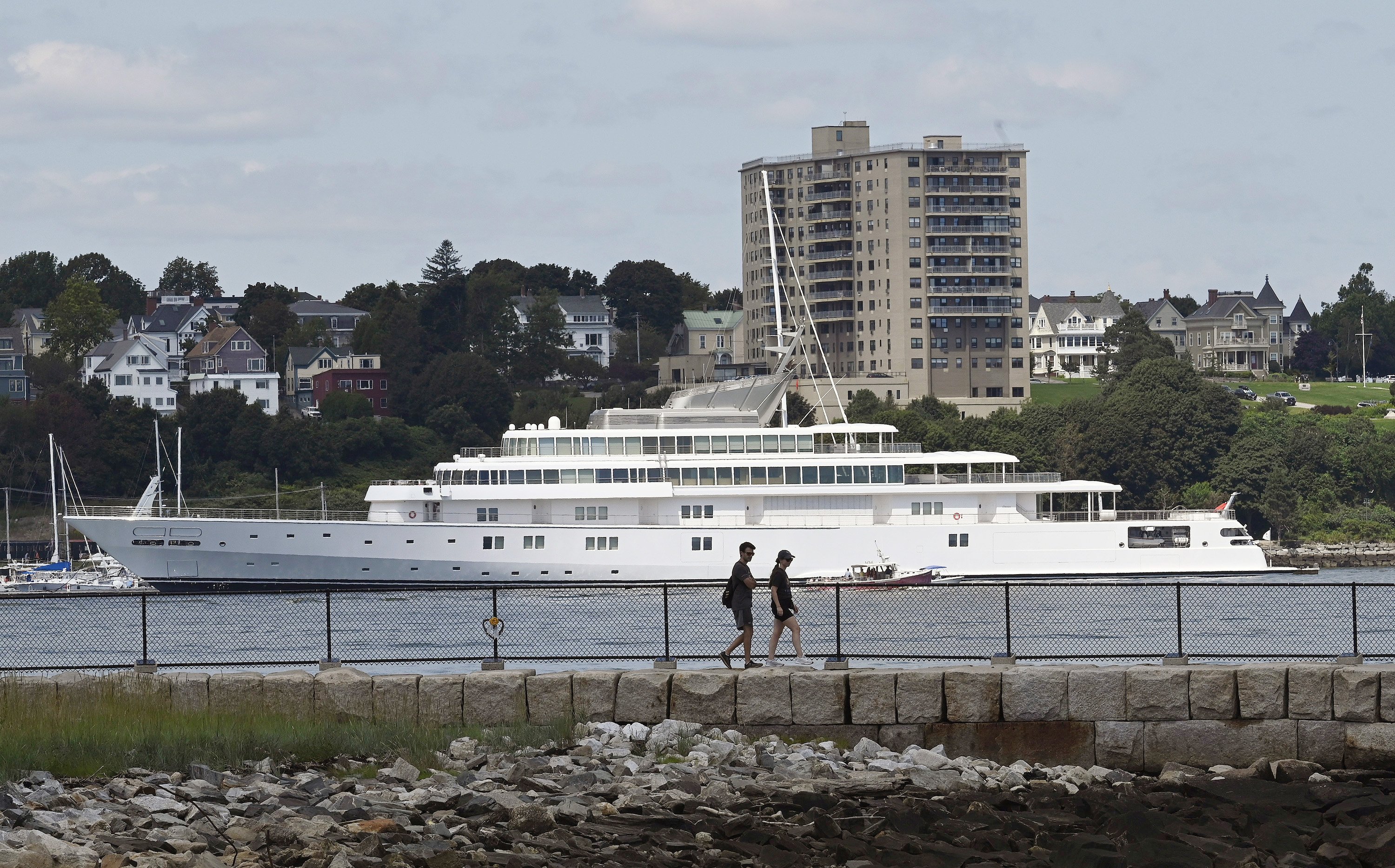People walk at Bug Light Park in South Portland with The Rising Sun, a five-story, 82-room super yacht owned by billionaire David Geffen, docked in the background in Portland in August 2023. Shawn Patrick Ouellette/Portland Press Herald, file Lawmakers are considering a proposed “impact tax” on luxury megayachts that dock in Maine. The proceeds would be used to support harbor infrastructure and public transportation.
Supporters of the proposal say it could address climate change effects from the large vessels while also helping to pay for the public facilities and services used by megayachts, which are defined as privately owned pleasure craft measuring at least 150 feet in length. “Given the level of necessity we have with maintaining our coastal infrastructure, I think this is a very reasonable revenue source in which to capture some of the value that is being received by these visitors and their megayachts and put it into coastal uses,” Sen. Rick Bennett, R-Oxford, the bill’s sponsor, said during a public hearing Friday.

Critics of the bill, LD 115 , said it would negatively affect the tourism industry and deter visitors from spending their money in shops and restaurants. The Maine Department of Environmental Protection also opposed the bill, saying it would be administratively burdensome. And lawmakers on the Transportation Committee, which heard the proposal Friday, raised questions about a lack of data on how many megayachts are coming to Maine, leading some to ask if the legislation is needed.
The bill would require municipalities that charge slip fees, which are fees for docking, mooring or using piers or other marine infrastructure, to also assess the tax. The charge would be $10 per foot of length over 150 feet and would be charged per day, up to 30 consecutive days. The charge would not apply to commercial fishing vessels, cruise ships or freight carriers.
Municipalities that collect the fees could keep 10% of them, while the rest would be transferred to a state Megayacht Fund. The money from the fund would be dispersed on a quarterly basis, with half going back to municipalities for harbor infrastructure and sea level rise mitigation and half being used for public transportation, including ferries. A similar bill sponsored by Rep.
Grayson Lookner, D-Portland, passed in both the House and Senate in the last Legislature, but was among several last-minute bills that died when Gov. Janet Mills refused to sign them for procedural reasons. The bills were enacted and sent to Mills on a day usually reserved for taking up vetoed bills, and Mills raised doubts about the legal authority to advance them.
Lookner said Friday that the need for a tax on megayachts has only grown in the time since he introduced his bill in 2023. In the last two years, Maine’s coast has been ravaged by climate change-driven storms that have resulted in millions of dollars in infrastructure damage at the same time as communities have struggled to raise revenues on their own. “Just as tourists staying in hotels pay a lodging tax, it is only right that those visiting in megayachts — floating palaces that can cost hundreds of millions of dollars — contribute their fair share,” Lookner said.
Bennett said megayachts have high energy needs, which cause them to contribute heavily to pollution, and said they are only owned by the extremely wealthy. He said fees on megayachts are not widespread in the United States, but they are more common in Europe, where some communities have also banned yachts over a certain size. There is no state-level tracking of how many megayachts come into Maine each year, and it’s hard to know for sure how many do, Bennett said.
“But I do know they are visiting Maine waters and visiting Maine ports,” he said. “I saw three of them last year myself. But we just don’t have the reporting to know exactly how many are coming.
” Lookner also said there is no hard data on how many megayachts are visiting Maine. But he said he had estimated two years ago that his bill, which had slightly different parameters for who would be charged, would have generated between $500,000 and $1.5 million per year based on anecdotal information.
Critics of the bill said it would hurt Maine’s tourism economy. “Our marinas and waterfront businesses already know that the crew and guests on these vessels spend generously on dining, provisions, including Maine seafood, artwork and services at businesses,” said Stacey Keefer, who spoke in opposition to the bill on behalf of the Maine Marine Trade Association. “Respectfully, we do not believe the bill sponsors understand these yachts are often run as a business .
.. It’s possible a captain might still spend (on these fees), but they might opt for a private marina instead or, more likely, just anchor out or skip going to that harbor completely.
” The Maine Department of Environmental Protection is also opposing the bill. In written testimony , the agency said it would be burdensome for them to oversee the collection of the fees by municipalities and the creation of a new program to distribute them. A fiscal note has not been published for the bill, but Bennett said he supports minimizing administrative costs.
“I wouldn’t want to create a system that requires additional staffing at DEP,” he said. “I don’t think that’s necessary.” Bennett said statements that the fees would discourage tourism are not credible.
“People who can pay tens of millions of dollars in maintenance per year will not be put off by paying an extra $500 or so per day,” he said. “And if they can spend thousands of dollars to moor in European destinations, they can certainly pay to dock at Maine ports.” Lavish and looming, gigayacht bobbing in Portland harbor attracts curiosity and contempt Lawmakers consider slip fee on foreign registered megayachts We believe it’s important to offer commenting on certain stories as a benefit to our readers.
At its best, our comments sections can be a productive platform for readers to engage with our journalism, offer thoughts on coverage and issues, and drive conversation in a respectful, solutions-based way. It’s a form of open discourse that can be useful to our community, public officials, journalists and others. Read more.
.. We do not enable comments on everything — exceptions include most crime stories, and coverage involving personal tragedy or sensitive issues that invite personal attacks instead of thoughtful discussion.
For those stories that we do enable discussion, our system may hold up comments pending the approval of a moderator for several reasons, including possible violation of our guidelines. As the Maine Trust’s digital team reviews these comments, we ask for patience. Comments are managed by our staff during regular business hours Monday through Friday and limited hours on Saturday and Sunday.
Comments held for moderation outside of those hours may take longer to approve. By joining the conversation, you are agreeing to our commenting policy and terms of use . More information is found on our FAQs .
You can modify your screen name here . Show less Please sign into your Press Herald account to participate in conversations below. If you do not have an account, you can register or subscribe .
Questions? Please see our FAQs . Your commenting screen name has been updated. Send questions/comments to the editors.
« Previous Next ».
Politics

Lawmakers may impose impact tax on megayachts visiting Maine

Supporters of the bill say the charge could be easily weathered by the wealthy owners of the private, luxury vessels. But critics say it could serve as a deterrent to tourism.















